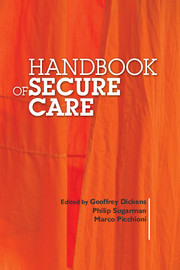Book contents
- Frontmatter
- Contents
- List of tables, boxes and figures
- List of contributors
- Preface
- 1 The evolution of secure and forensic mental healthcare
- 2 Mental disorder and offending
- 3 Clinical risk assessment in secure care
- 4 Risk management in secure care
- 5 Recovery in secure environments
- 6 Personality disorder
- 7 Women's mental health, aggression and offending
- 8 Offenders with intellectual disability in secure services and the criminal justice system
- 9 Secure mental healthcare for young people
- 10 Secure care for people with autism spectrum disorder
- 11 Acquired brain injury, trauma and aggression
- 12 Managing aggression and violence in older people
- 13 Firesetting in secure settings: theory, treatment and management
- 14 Specialist psychological treatment programmes in secure mental healthcare
- 15 Nursing in secure mental healthcare settings
- 16 Prescribing for specialist populations
- 17 Human rights in secure psychiatric care
- 18 Quality assurance and clinical audit in secure psychiatric care
- 19 Psychological support following violent assault and trauma: what works for staff in secure settings?
- Index
Preface
Published online by Cambridge University Press: 02 January 2018
- Frontmatter
- Contents
- List of tables, boxes and figures
- List of contributors
- Preface
- 1 The evolution of secure and forensic mental healthcare
- 2 Mental disorder and offending
- 3 Clinical risk assessment in secure care
- 4 Risk management in secure care
- 5 Recovery in secure environments
- 6 Personality disorder
- 7 Women's mental health, aggression and offending
- 8 Offenders with intellectual disability in secure services and the criminal justice system
- 9 Secure mental healthcare for young people
- 10 Secure care for people with autism spectrum disorder
- 11 Acquired brain injury, trauma and aggression
- 12 Managing aggression and violence in older people
- 13 Firesetting in secure settings: theory, treatment and management
- 14 Specialist psychological treatment programmes in secure mental healthcare
- 15 Nursing in secure mental healthcare settings
- 16 Prescribing for specialist populations
- 17 Human rights in secure psychiatric care
- 18 Quality assurance and clinical audit in secure psychiatric care
- 19 Psychological support following violent assault and trauma: what works for staff in secure settings?
- Index
Summary
In any society a small proportion of people with mental disorder present with behaviour that transgresses norms and violates the rights of others. Concurrently, the same people are often vulnerable themselves – to violence, to abuse or exploitation by others – or at risk of neglect or selfharm. High rates of mortality are well documented. Long conceptualised as a ‘forensic’ population, they interface between mental health and criminal justice systems, and require containment for a time in secure services to manage risk. In recent years a growing realisation has been that both protection of the public and the personal recovery of these patients must be championed by progressive, specialist clinicians. The label ‘forensic’ is an insufficient descriptor of this group of services which provide care and treatment for mentally disordered offenders, but also for a range of individuals who have not been diverted from the criminal justice system. Many clinicians who work in secure services do not self-identify as ‘forensic’ practitioners. This book provides an overview of the clinical populations, professions, assessment and treatment approaches used in a wide range of specialist secure services. It does so with the intent of providing the broadest possible perspective and so we have opted to title our book the Handbook of Secure Care.
The aim of secure services has shifted over time from primarily containment to active programmes of therapy and rehabilitation within care pathways, which aim for less restrictive placements through levels of security, leading to open and community care and reintegration into wider society. Concurrently, services have grown, with an increase in the past decade in the number of secure mental health beds in many countries. In the 21st century this expanding sector has seen new super-specialisms (i.e. subspecialties) whose more bespoke skills reflect the needs of diverse niche groups. This diversity is expressed across diagnostic boundaries, from mental illness and intellectual disability to autism, brain injury and degenerative disorders. Distinct secure care pathways have evolved for men, women, adolescents and the elderly. Dedicated facilities also now exist for younger adults and the pre-lingually deaf.
- Type
- Chapter
- Information
- Handbook of Secure Care , pp. xi - xiiPublisher: Royal College of PsychiatristsPrint publication year: 2015



